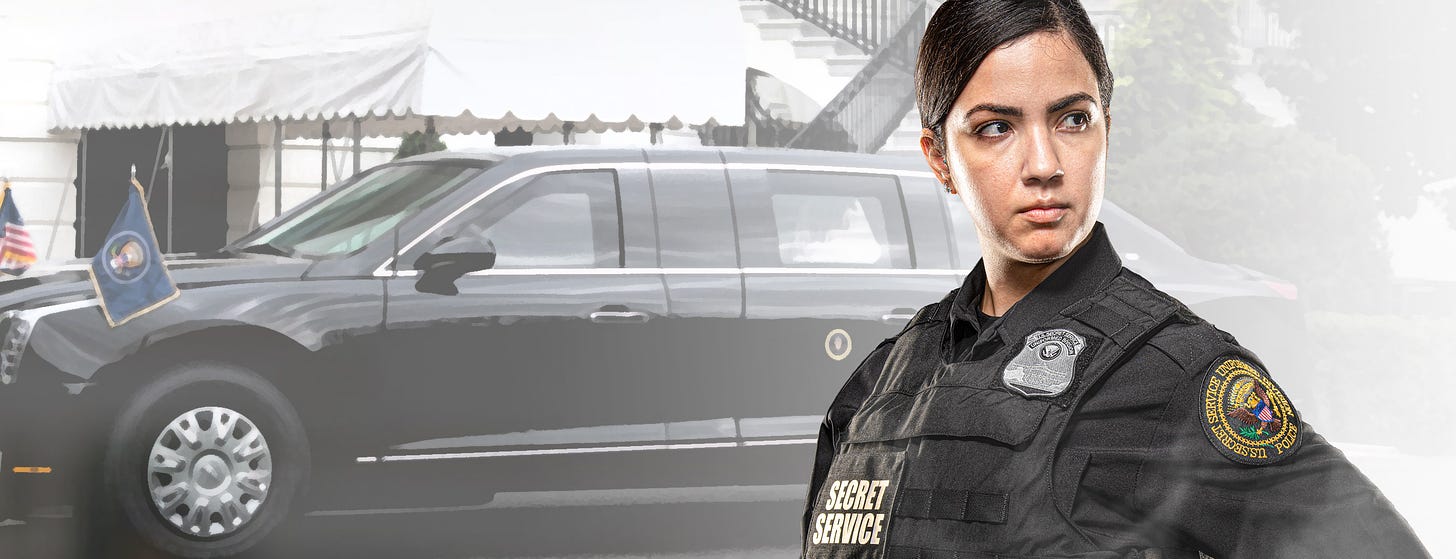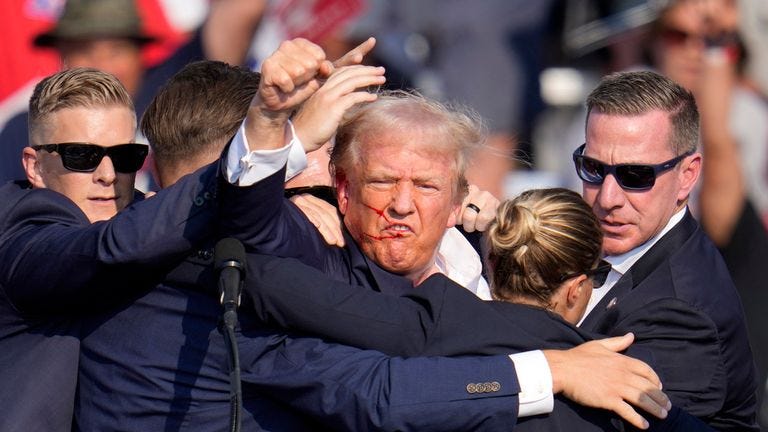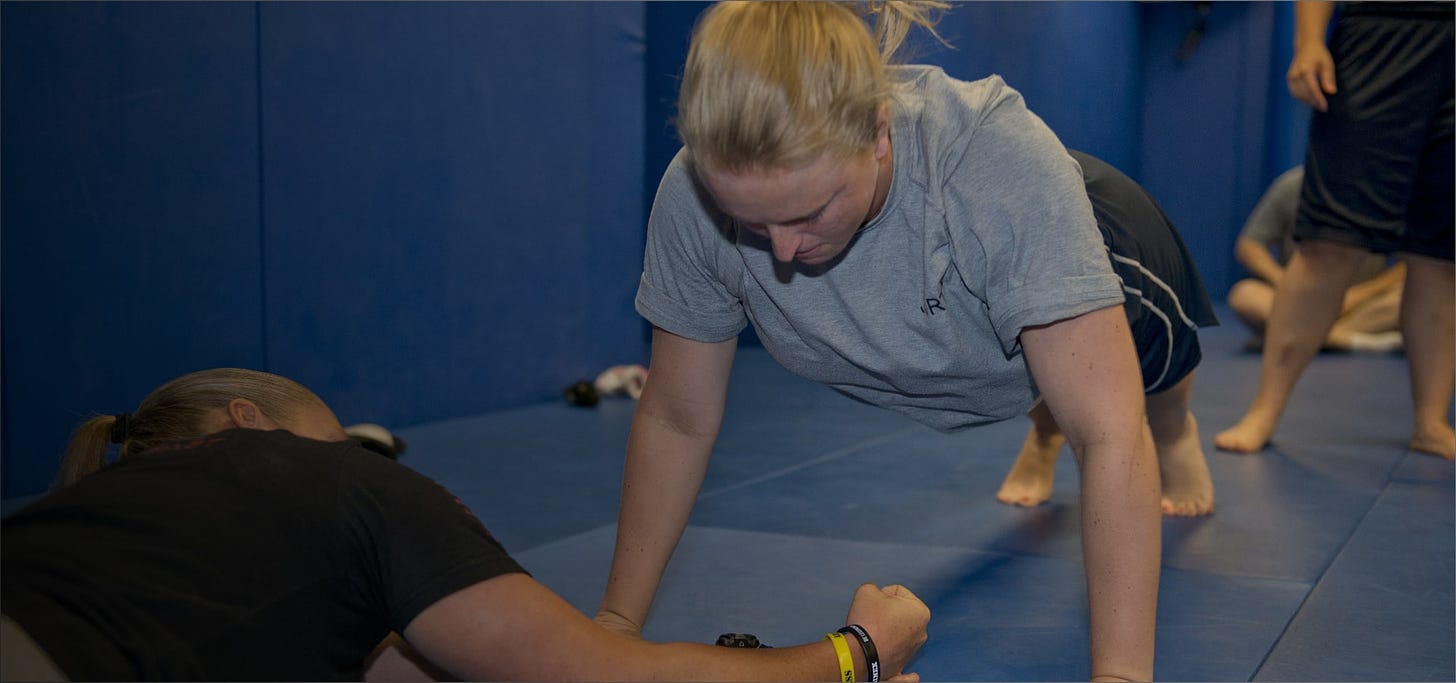“Fight! Fight! Fight!” vs. “Diversity! Diversity! Diversity!”
Advocates of diversity got a well-deserved setback at Trump’s Pennsylvania rally
Many observers have had harsh words for the female Secret Service agents who performed poorly in response to the attempt on Trump’s life last Saturday (see this Wired article for a catalogue of the charges, in which the author cannot muster a single rebuttal). Some noted that Trump’s security detail for the Republican National Convention is now, it appears, exclusively male. And rightly so. There is no equality when bullets start to fly, and it is lethal to pretend there is.
When the first shot rang out, 50-year-old Pennsylvanian firefighter Corey Comperatore is reported to have done what men typically do in such situations: he shielded his wife and daughters, taking a bullet to the head. Women far more rarely perform such acts of self-sacrifice.
Comperatore lost his life because of a multitude of errors on the part of the Secret Service, including a long hesitation by snipers tasked with neutralizing threats. Video shows that at least one of these snipers, seemingly with the gunman in his sites, failed to take action until seconds after the gunman began firing. The agent seemed befuddled, scrambling back when the first shot came. Was he new on the job, inadequately trained, or sub-par in his skills? Or directed not to fire?
I am not equipped to answer these or the many other, darker, questions about the bungled security operation. What can be said for certain is that if some element of the Secret Service was not treasonously complicit in the attempt on Trump’s life, it was certainly massively inadequate to its task of protecting him and others at the rally. The gunman was allowed to gain access to his rooftop shooting position, and Trump was not extracted the moment the shooter’s presence became known.
Director Kimberly A. Cheatle, who expressed to CBS News in interview her concern with “developing and giving opportunities to everyone in our work force, and particularly women,” has a lot to answer for.
Perhaps the women we saw in Trump’s security detail were new recruits helping Cheatle reach her target of 30% women by 2030. They looked amateur, panicked, and unpracticed. One of the women attempting to remove Trump from the stage was simply too small, and hesitant, for the task; she looked at one point as if she were engaged in a group hug at a United Church reconciliation ceremony. (As many have noted, her small stature enabled Trump’s fist-raised gesture of masculine defiance and his exhilarating “Fight! Fight! Fight!”). As Trump was being taken into the security vehicle, the four women surrounding the car looked jumpy and confused, scared and awkward. One woman was visibly unable to holster her gun.
I’ve never seen so many women guarding a former president, and I’ve never seen so many women obviously incapable.
We know that men and women have different strengths and aptitudes. Nearly a decade ago, the United States Marine Corps demonstrated through a year-long study of hundreds of Marines that even women who could pass the physical exam simply could not carry out standard military tasks as efficiently as men. The study found, unsurprisingly, that “The males were more accurate hitting targets, faster at climbing over obstacles, better at avoiding injuries.” The women struggled to carry weapons and ammunition, and even to use the weaponry properly. Women’s higher injury rate was marked: “The well documented comparative disadvantage in upper and lower-body strength resulted in higher fatigue levels of most women, which contributed to greater incidents of overuse injuries such as stress fractures.”
There is also, of course, a crucial psychological element to work in highly stressful conditions. Women respond differently to danger, with men more inclined to focus on action, women more likely to experience a rush of fear and self-protectiveness. A 2000 paper argued that women look to “tend and befriend,” i.e. to find ways to protect themselves and their offspring. A 2009 Polish study targeted sexed differences in the brain using functional magnetic resonance imaging. When confronted with negative stimuli, men’s brains directed their bodies to take action; women’s to experience strong feeling.
In light of the known lesser fitness of most women for dangerous situations requiring extraordinary calm, physical courage, focus, and weapons capability, it is alarming to read through Secret Service web documents that show the Service obsessed with getting more women into the organization. Merely reading the materials highlights the countless hours spent affirming gender equity, developing policies to achieve it, and showcasing it for public consumption. Perhaps all that hoopla distracted the female agents from doing their emergency drills.
In the Director’s Message that prefaces the Secret Service Strategic Plan for 2023-2027, Director Cheatle emphasizes in the very first sentence that the Agency is “focused on achieving excellence through talent, technology and diversity.” The reference to diversity is not mere rhetoric, and it doesn’t mean, as it once did, a diversity of top-level expertise: it means hiring women and other underrepresented groups, including people with disabilities. Throughout the strategic plan document, discussions of Secret Service objectives are continually coupled with references to diversity ideology. For example, we are told that, “We will focus on mission requirements, merit, retention of talent, and empowering future leaders at all levels. We will do this while advancing equity and transparency in professional development opportunities.” The goals listed are blatantly incompatible: focusing on merit and talent involves hiring and promoting the best, regardless of identity category; equity necessitates making merit and talent secondary.
The strategic plan’s saccharine diversity messaging turns bitter when read in light of Saturday’s failures: “Successful organizations create and foster cultures that recognize each employee’s unique contribution to the mission. We must embrace diversity, equity, inclusion and accessibility (DEIA) across the agency. DEIA must be demonstrated by all employees—leading by example—through every action, every day.” The empty hyperbole nauseates. As is usually the case with pro-diversity boilerplate, no attempt is made to explain how gender, sexual, and racial diversity could possibly aid the Secret Service mission to protect the nation’s leaders, let alone why it would need to be demonstrated, whatever that means, “through every action, every day.” The statement is meaningless and inane.
Evidence of the yawning chasm between diversity ideology and the Agency’s mission can be found on the webpage Women at the Secret Service, which is replete with pictures of sassy gals in uniform looking pleased with themselves. These women, it is announced, “fulfill our agency’s public safety and security mission with integrity and strength.” I’ll have more to say about the strength claim in a moment. Front and center is the smoking gun: “Secret Service prioritizes recruiting women candidates.” It is not enough, apparently, for the Service to guarantee that it will not discriminate against women. Instead, it must discriminate in their favor. It must seek to hire them because they are women, despite the fact that women are generally less capable than men, physically and psychologically, of performing well in dangerous, high-stress conditions.
The webpage celebration of women is indifferent to the question of their fitness for Secret Service work. Some pull quotes showcase the typical bigotry and emotional incontinence of the pro-diversity worldview: “The diversity I see throughout the Secret Service is encouraging,” enthuses one. “To look around and see minorities and women in leadership positions is a breath of fresh air.” It’s not clear what is so fresh about a decades-old policy to unjustly advantage women and minorities. The statement is a rank insult to the white men who have put themselves in harm’s way throughout the history of the Secret Service, including, for example, those who were seriously wounded protecting President Ronald Reagan when he was shot by John Hinckley Jr. in 1981.
Special Agent in Charge Jerry Parr singled out Tim McCarthy for special praise after he took a bullet in his abdomen while shielding Reagan (McCarthy survived). “Training can only do so much,” Parr wrote. “It takes a more profound motive to respond the way Tim McCarthy did. It was a response, self-sacrificial in nature, which all Americans in general, current and future agents in particular, will write about and think about for as long as this Agency exists.” It may be that a generation of agency women will manage to forget it quite quickly.
As the webpage makes clear, having women in the Secret Service is all about what makes women feel good. “My daughter’s face lights up with joy whenever she sees me put on that shiny gold badge,” affirms one of the pull quotes. Why mention such a preposterous alleged fact? Are we really to believe that women should be hired into the Secret Service because somebody’s daughter likes the badge? Such irrational effusion, which agency higher-ups thought appropriate for public display (!!), is a vivid red flag signaling the undermining of the agency’s talent.
The agency doesn’t even attempt to hide the fact that women are not held to the same physical standards as men. A glance at the webpage on fitness requirements shows that the Secret Service physical strength test for women is much less rigorous than for men. Whereas a man in his 20s is expected to be able to run 1.5 miles in 10:16 to achieve an excellent rating, a woman in the same age category is asked to complete the run in 12:50, nearly 3 minutes slower, for the same rating. The excellent man must do 11 chin-ups while the excellent woman need aim only for 4. It is thus recognized that even the best female agents will not have anywhere near the upper body strength of the best men.
And female recruits need not be excellent. It is possible to be unable to do a single chin-up and still obtain an adequate aggregate score in the other fitness categories in order to qualify for a Secret Service position. One may object that agents need not perform chin-ups to guard a president, but the tests of strength and speed are indicators of general physical ability. Moreover, if physical standards are so flagrantly compromised, one can only imagine how other, less easily measured, standards are let slide in obeisance to the great god Diversity.
Cheatle’s preoccupation with bringing more women into the Service is staggeringly unacceptable in an arena where mistakes can be catastrophic. Even amongst the already competent and well-trained, relatively small differences in analytical intelligence, reaction time, courage, and calm may mean the difference between mission success and failure. But it seems that nearly anything can now be sacrificed to keep some women happy.
Lest I be misunderstood, I harbor no ill will towards the flustered, seemingly unprepared women who weren’t of much use to Trump when it mattered. They may well be good people wishing to serve their country, having been lied to all their lives about gender equality. It is the diversity-touting woman at the top and all those who supported her insane agenda who deserve condemnation, firing, and serious investigation.
The simple fact is that women have no place on the front lines of any security, policing, firefighting, or military operation. Let them serve in support roles with honor where they have the ability and drive. But let’s stop pretending they should or can do men’s jobs.








I was wrong about Kimberly Cheatle refusing to resign!
With this and really all diversity policies, it seems like there's a sort of blindness as to how we got here as a civilzation. That everything just works through some mysterious power so if we diversify it won't matter. The wheels will keep turning.
For example. I work at an electrical utility engineering company. We have what I call "diversity by coincidence" because we hire smart people who happens to be all sorts. But if we hired, say, people who are bad at engineering but tick the right boxes, then the engineering doesn't get done right or at all and the power goes out.
The DEI people don't understand what makes civilization work. They think it'll just going through, I dunno, momentum?